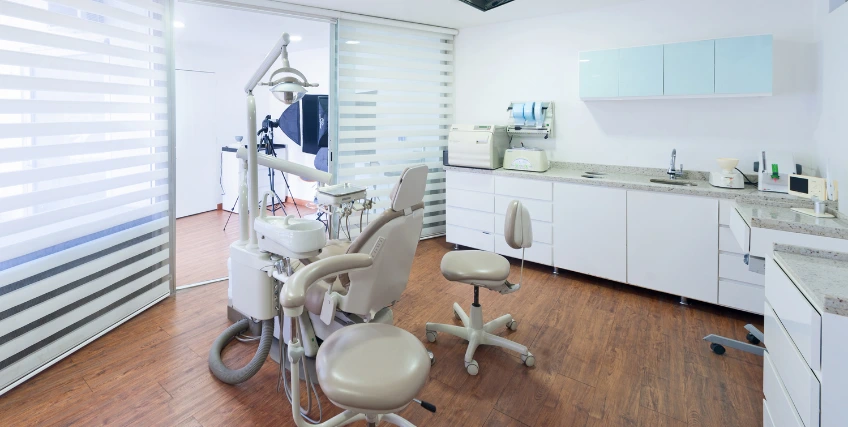Best Financing Options for Buying a Dentist Office
February 05, 2025 | Last Updated on: February 06, 2025

The Best Financing Options for Buying a Dentist Office
Owning your own practice is the dream of many dentists. It offers the freedom that comes with entrepreneurship, as well as the financial returns that come with being a business owner. But as in any industry, buying or starting a company requires significant capital. Whether you’re looking to expand, purchase real estate or equipment, or cover short term costs during a rocky startup period, dental financing can be an essential solution for your dental practice.
There are many paths to owning a dental practice
Dentists have three main reasons for looking into acquiring a dental work loan.
Startups
Firstly, there’s the opportunity to start a new dental practice. It’s an appealing option for many reasons. Practice owners are in full control of the future and growth of the practice. They’re able to establish and care for the business they want to run in the way they want to run it.
However, a dental practice startup requires significant capital to launch. You’ll need to cover expenses like purchasing or leasing real estate, dental equipment, payroll, marketing, and more. Many of these costs will be incurred and may even come due before you start receiving income, making dental financing essential.
Acquiring an existing dental practice
A second path to owning a dental office is through practice acquisition. While an existing practice means that the new owner may not have total control over a brand-new practice, there are a few material advantages to purchasing an existing office.
First, dental equipment can be expensive. Purchasing the equipment needed to run a successful practice can cost six figures or more. However, purchasing an existing practice can reduce that headache.
In addition, a startup has no existing customers and without customers, there’s no guarantee of cash flow. Acquisition solves that issue. Acquiring a practice likely means acquiring existing real estate and clientele, meaning that you’ll jump right into an existing stream instead of trying to create everything for yourself.
Finally, there’s the problem of commercial real estate. By acquiring an existing, profitable practice, you’re selecting a company that already has shown that its location leads to a successful company.
Growth and expansion
You may already own or part-own a dentist practice and are looking to take your company to the next level. You can look at expanding your existing company as a combination of the two above paths. As you’ve got an existing clientele and existing cash flow, you won’t need to worry there, but you’ll also get the chance to pivot or adjust your services and location in such a way that you might be able to boost profits. Loans for dentists are made for situations just like this.
Which Dental Financing Option is Right?
There are innumerable loan options for the aspiring owner of a dental business. Some financial institutions even have entire divisions set up for dental financing.
Having said, the best loans for dental work can depend on many factors, like credit scores, student debt, path to ownership, desired loan amount, target use, or loan terms.
Like every part of owning a business, you should take the time to examine your business plan and understand the "why" behind every part of your loan to ensure that your financing option is the best one for your company, and your business plan should of course be tailored specifically to dentistry.
SBA Loans
Loans backed by the Small Business Administration (SBA) are, for many borrowers, can be a great option to consider If you’re looking for the lowest interest rates, a long repayment term, and flexibility of purpose, you may want to look into any one of the various SBA loan programs.
SBA loans can be huge – anywhere up to $5,500,000 and can be repaid as far out as 25 years for real estate loans (10 years for other types of SBA loans). They can be used for a wide variety of purposes like buying equipment, paying employees, refinancing existing loans, buying real estate, and more. In fact, the SBA itself has published a success story about a dentist using an SBA loan to purchase real estate.
Term Loans
Term loans are what you picture when you think of a loan – you borrow money from a financial institution and agree to repay that loan with interest over a set amount of time through installments. The interest rate and length of repayment will depend on your lender and your creditworthiness.
Alternative Lenders
If you’re looking to borrow slightly less money (up to about $250,000) and have the cash flow to support higher fees, interest rates, and quicker repayment terms, alternative or online dental finance companies might be an excellent path for financing.
Because alternative lenders are not banks, they’re able to cut much of the red tape that can make bank lending a hassle. You can expect fast approvals and you may still qualify even if you don’t have good credit.
However, to compensate for those advantages, alternative lenders tend to make smaller loan offers, higher interest rates, and generally higher origination fees.
Equipment Financing
Equipment financing is particularly helpful in the dental industry when a practice owner is considering renovation, purchasing equipment, or upgrading their office space.
Equipment financing is exactly what it sounds like. An equipment loan is given for the express purpose of buying, leasing, or upgrading new equipment. In the healthcare field, that can be remarkably expensive, but also vital to growth and expansion.
Like all small business dental loans, there are advantages and disadvantages to an equipment loan. For one thing, equipment financing tends to be easier to get than other types of financing because the equipment serves as collateral for the loan. If the borrower is no longer able to make the necessary payments, they simply repossess and sell the equipment. There’s minimal risk to the lender, so the borrower can expect favorable terms and won’t necessarily need to have a strong credit history (this is one type of financing where even companies with bad credit may still get a loan)
Business Lines of Credit
Many small business owners hold a line of credit in their back pocket. A line of credit functions more like a credit card than a loan. A financial institution agrees to a certain credit limit and interest rate upfront but only requires payment on money actually borrowed.
That flexibility makes business lines of credit an excellent stopgap in a short-term crisis. Many borrowers will seek approval for one and only use it in desperate times, or when a short-term opportunity becomes available.
Preparing to Seek Financing
No matter which path to practice ownership you’re seeking, and no matter which type of loan is most suitable for your needs, there are a few things you should do to save maximum money over the long term and set your practice up for success.
Maximize creditworthiness
Credit scores are vitally important when it comes to loans. And regardless of which type of dental financing you’re going for, building your credit score is key. That means maximizing your debt-to-income ratio, not missing any payments on credit cards or existing loans and preventing too many hard inquiries.
Setting up your business’s credit score might require paying off an existing loan before expansion is possible. It could mean debt consolidation to simplify preexisting debts. Or it could mean finding ways to keep debt steady while increasing profits.
Understand the application process
Acquiring capital can be a long, complex process. Once you’ve decided which type of loan you’re going to seek, you should research the institutions able to provide that loan and understand the application process inside and out.
You want to make sure that you’re fully cognizant of everything you need to submit to successfully apply for dental financing. That means understanding the paperwork necessary, the credit requirements, and loan availability. It also means knowing if you’re qualified for that loan, or if your business meets the criteria required.
Lenders know that dentists are a good bet
If there are people with teeth, there will be dental treatment providers doing excellent business, and that means lenders will always be underwriting loans for dental practices and their dental expenses. So, make sure you do everything possible to understand the business plan, the necessary steps for capital acquisition, and go forth with confidence that you’ll be able to discover a dental financing solution that meets your needs.
FAQs about dental financing
What types of dental financing are best?
The best type of dental financing will depend on your needs and what you can qualify for. In general, SBA 7(a) loans, term loans, business lines of credit, and even equipment financing may be financing plan options for many dentists.
How can an SBA loan help purchase a dental practice?
If you qualify for an SBA loan when seeking dental financing, you may be able to get up to $5.5 million with an attractive annual percentage rate, including re-payment options with good terms.
Can I get financing if I’m a first-time dental practice owner?
Yes! You may be able to get dental financing as a first-time owner through an SBA loan, or from any number of dental finance companies.
What are the costs associated with buying a dental practice?
Of course there’s the purchase price, but then you may also need to cover the cost of equipment and supplies, real estate, and working capital for payroll, operations, and your initial cash flow. Dental financing can help you with all of these costs.
How do I qualify for dental practice acquisition financing?
Lenders will do a credit check, look at your dental experience, the profitability of the dental practice, your ability to make a down payment, and your business plan. If you can, see if you can pre-qualify for the financing even before you’ve identified a practice to purchase.
Frequent searches leading to this page




